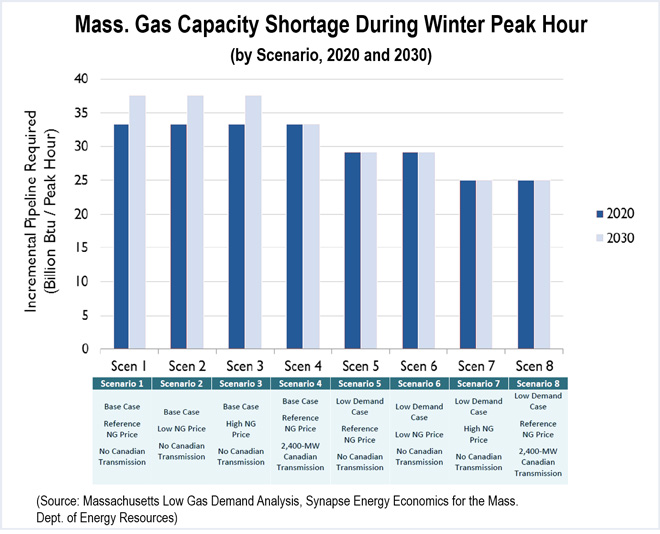By William Opalka
Massachusetts needs additional natural gas pipeline capacity to avoid severe energy shortages in the next few decades, a study commissioned by the state concluded. Even if the capacity is built, winter price spikes caused by severe cold and competition for gas as a heating fuel will remain through 2019, according to the “Massachusetts Low Gas Demand Analysis” study by Synapse Energy Economics.
Measures like demand response, the ISO-NE Winter Reliability program and fuel switching to oil-fired generation will meet electricity demand, but price shocks will occur, Synapse said.
The study, ordered by former Gov. Deval Patrick, repeats many of the same claims from previous analyses by New England states and the regional power grid operator. Environmental advocates from The Acadia Center said the study was too limited in its scope and unnecessarily justifies construction of a controversial gas pipeline that would serve the entire New England region.
The Synapse analysis considered eight scenarios, including low and high natural gas prices, and whether up to 2,400 MW of Canadian hydropower would be available. The scenarios were evaluated from an economic and reliability perspective and assessed for compliance with state Global Warming Solutions Act (GWSA) targets.
Necessary pipeline additions by 2020 range from 25 billion Btu per peak hour for scenarios that assumed low gas demand and a combination of high natural gas prices and no incremental Canadian hydropower, to 33 billion Btu per peak hour for analyses that considered various combinations of gas price assumptions and whether Canadian hydropower was added. By 2030, the additions range from 25 billion Btu per peak hour to 38 billion Btu per peak hour.
The Acadia Center (formerly Environment Northeast), while supportive of the effort to explore alternatives, believes the study is incomplete. The group said it could be misinterpreted as support for a new subsidy that would shift multi-billion dollar risks from private corporations to the public.
A proposal by the six New England governors for a $3 billion taxpayer-supported pipeline transporting shale gas from Pennsylvania stalled in August due to cost concerns in Massachusetts. Patrick temporarily suspended the state’s support of the pipeline after the state legislature failed to act on additional transmission lines to import Canadian hydropower.
The transmission expansion and natural gas pipelines are seen by New England governors as integral parts of an overall regional energy strategy.
The study is limited to Massachusetts, which uses less than half of the energy required in New England and does not have nearly as much renewable energy potential as neighboring states, the center says. It also uses outdated prices for oil and liquefied natural gas, the group said.
“Massachusetts has taken an important but preliminary step toward thorough analysis of viable supply- and demand-side solutions to meet our energy needs,” Acadia Center President Dan Sosland said. “Because electric ratepayers across New England are being asked to subsidize the construction of a pipeline that could take decades to pay off, alternatives need to be examined in all New England states to ensure that we have an accurate, up-to-date picture of how to power the region while reducing risks to consumers and bringing down greenhouse gas emissions.”



